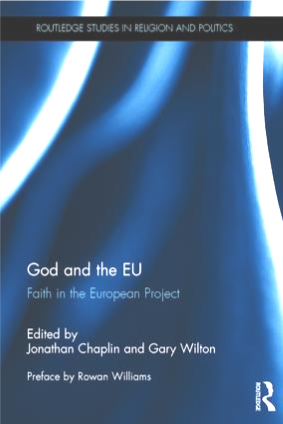God and the EU: Faith in the European Project
Chaplin and Wilton (Eds.), God and the EU: Faith in the European Project, Routledge: Abingdon, 2016
This collection of essays on the contemporary relevance of Christianity to the European Union makes an important contribution to debates on the current travails of the EU and its future. Published just a few months before the UK’s referendum on EU membership it provides a long-overdue “political theology of the EU” and a necessary challenge to secular political discourses. The chapters dovetail with each other very well and authors often direct the reader to a more detailed treatment of a topic in another chapter making it a more coherent work than is often the case of multi-author books. For this the authors, and editors, are to be commended.
The book is divided into two parts. The first presents the Christian “inspirations” that contributed to the origins of the EU or which illuminate our understanding of its contemporary structures and aspirations. Chapter 1 examines the Christian foundations of the EU and in particular the content and significance of the Schuman Declaration (1950) which, following its evaluation, is included as an Appendix.
Christian Foundations of the EU
Chapters 2 to 4 provide accounts of the contributions of Catholic, Protestant and Orthodox voices to the evolution of the EU. Of particular interest is Sander Luitwieler’s analysis of the reasons for the often ambivalent attitudes of Protestant leaders towards European integration namely the Protestant understanding of the church as a universal but invisible reality in contrast to the Catholic visible centralised institution.
Three further chapters conclude part one. Economist Werner Lachman describes the emergence of the German Social Market Economy from its roots in Protestant ethics. He highlights six biblical themes that were hugely influential in SME: human dignity, economic “blessing”, justice, love, human freedom and truthfulness. He argues that the Treaty of Rome and the creation of the euro required compromises between the French state-led model and the German market-led one which have contributed to the EU’s current economic problems. And Joshua Hordern explores what a “theology of place” might contribute to a renewal of local, national and Europe-wide political consciousness.
Yet it is Adrian Pabst’s chapter that provides the most penetrating analysis of the EU’s current crisis. He suggests that the push for European integration has not just contributed the so-called “democratic deficit” but to a much more serious crisis of legitimacy. He locates the reasons for this in the ideology of the secular “market-state” which sacralises politics and economics over life and land.
Furthermore he suggests that the EU lacks what Charles Taylor has called a “social imaginary” which, though unstructured and unarticulated, frames our social coexistence and mutual expectations. Pabst’s critique hits the proverbial nail on the head: “The EU has helped create a sense of Europe as an economic-political entity but no shared imaginary that translates into mutual understanding and sympathy among European citizens”. His chapter ends with a proposed alternative vision for Europe, a civic commonwealth which is sustained by the renewed Christian polity that can be a “bastion for people of all faiths and none”.
Political Theology and the Future of the EU
Part two of the book moves beyond theory to consider EU policy areas and the contribution that political theology might make. The areas covered include religious freedom, the Eurozone, environmental and science policy. The two standout chapters were Johan Graafland’s “Christian economic ethics and the euro” and Diana Jane Beech’s “A soul for European science”.
Graafland uses the Christian values of human dignity, common good, justice, solidarity and subsidiarity as a way of evaluating five Eurozone policy options with a particular focus on Greece. Following a detailed treatment of the roots of the euro crisis, the policy options, his evaluation of them both from the economic perspective and that of the aforementioned Christian values, his striking conclusion is that “solidarity with Greece would actually require a Grexit” (Greece leaving the Eurozone though not the EU).
The vacuum of values in current EU science and research policy is the focus of Diana Beech’s chapter. She recalls the signing of the EURATOM Treaty (1957) which put scientific research, specifically European atomic energy research, to the service of international diplomacy giving CERN as a concrete example of this. This is contrasted with current policy which is dominated by the drive “to increase the efficiency and effectiveness of Europe’s research systems to ensure maximum output”. The original moral and spiritual drivers of European science policy are a distant memory.
Editor Jonathan Chaplin concludes that political theology contributes “a critical, constructive voice to the common discourse of the EU”, “a role of resistance” in every area of the EU’s political agenda.
At £90 (105 euro) this book will be well out of the price-range of most Vista readers. For that very reason we thought it was worth a detailed longer review. Though we might not agree with the conclusions of all the authors the book’s main thesis is powerfully made: the displacement of Christian voices from the European political discourse has left the floor to secular voices alone. Christian values had a vital role in the EU’s foundation: if the house we inhabit is to stand its Christian prophetic voices must be heard again.
Jim Memory, Lecturer in European Mission,, Redcliffe College

